- Home
- Nancy Means Wright
Stolen Honey Page 7
Stolen Honey Read online
Page 7
“Somebody painted Squaw on my bicycle,” Donna said, suddenly blurting it out, then reddening with the confession. “It was one of those ZKE boys, I’m sure, I saw them afterward, laughing.” Emily looked at her.
“It was worse than that. It was horrible. It said, Squaws Fuck. Squaws Kill. Like they really think I killed that boy!” The tears were crowding her eyes again.
“Hey,” Emily said, “the ones that count know you didn’t hurt that guy. The frat boys are just looking for a scapegoat. Not to mention a good lay. That dumb Bozo thinks I’m a lay ’cause I’m a town girl. Well, you can’t give in to them or they’ll take advantage.”
“I know,” Donna said, wiping her eyes with her sleeve. “That’s what Mother says. I mean, that’s what she’d say if she knew what I’ve been going through. But I don’t tell her everything. She’s in trouble enough with the police for planting marijuana.”
Emily laughed. “My mother plants hemp illegally. They’re a pair, your mother and mine. Mom’s getting to be a living example of civil disobedience. Now she’s burning her trash out in the pasture, and that’s against the town ordinance.”
Emily got Donna blowing her nose, laughing about their unruly mothers. Donna told how her mother burned her trash, too, because she couldn’t afford to pay thirty dollars a week to have it carted away. “Now Uncle Olen’s found out about it, but he doesn’t say anything because he’s in love with her.”
“Really?” Emily sat down on the porch steps and Donna sank down beside her, shrugged her book bag off her back. It felt good to do that; her shoulders straightened and she felt lighter.
“Sure, he is. Of course, he’s ages older than she is. I mean, like fifteen years. He’s ready to retire, practically. Mother’s forty-six.”
“She’s younger than my mother. Mom just turned fifty and she doesn’t like it.”
“Who would? Anyway, Uncle Olen’s a bug about obeying the law, but because of Mother he has to make compromises. He’s having a struggle.”
“Does your mom like him? I mean, you have a father, right?”
Donna glanced at her friend. She knew that Emily’s father had left the family for another woman. But Emily’s face was expressionless.
“As a family friend, that’s all. Mother knows how he feels. She just ignores it. But he’s helping now to clear our names. So I want him to keep coming around. I want to get this behind us. I want to go on with my life.”
“Yeah, I know.”
The girls sat in silence a few minutes. Donna heard a tractor grinding up from the pasture. It was pleasant here, with the pear trees in delicate white bloom, the mountains rising lavender-blue across die road. At home Donna lived in the mountains, she could hardly see them for the trees.
The tractor struggled up the drive and quit, and Ruth Willmarth climbed down. She didn’t look fifty at all, Donna thought. She was, well, young-looking, with gray-brown hair pushed haphazardly on top of her head, a blue denim shirt open to her sweaty neck. But when she turned to face them, Donna saw that she was upset about something.
“Is your mother coming by?” she asked Donna. “Something’s happened to the hives. The upper ones have been knocked off and some of the bees are dead. Another bunch have swarmed up in a maple tree. It could have been an animal, I suppose, a bear looking for honey. I only hope it wasn’t one of my heifers— Zelda, maybe. That beast!”
“Mother’s coming to pick me up,” Donna said. “I don’t know why the bees should be dead.” She looked up at Ruth Willmarth’s flushed face.
She did know, though. She knew. And it wasn’t Ruth Willmarth who was under attack. It was herself—and her mother. Someone was blaming them. Someone wanted to destroy their lives, the way the nightshade had destroyed Shep Noble.
She dug her hands deep into her pockets, felt the lining rip.
* * * *
It was nothing Ruth had done, Gwen assured her when she pulled in an hour later to pick up her daughter; it might well have been a bear. “Last spring an old black fellow knocked over one of my hives searching for honey.” Gwen sent Leroy to tend to the damaged hives while she undid the swarm. Already part of it was on the ground from the weight of the few thousand bees that had dragged down the maple branch. She placed a new hive body on the grass with the entrance near the bees and spread a sheet in front. The bees would have to walk over the sheet to get into the hive and the white sheet would make the queen easier to spot.
“It’s possible that somebody did this to get back at me,” she told Ruth while they were waiting for the bees to catch on. She didn’t want to worry Ruth, but she had to tell someone. “There was a letter to the editor in the paper, a woman deploring my conduct. Meaning more than the nightshade—meaning, oh, yes, my ‘mixed’ marriage. The backwoods bigot!” Gwen felt confused, wanting to disbelieve; wanting to accuse. She felt better, though, for having shared her thoughts.
“Seems to me you’re a backwoods liberal,” Ruth said, and Gwen had to smile then.
“The longer I live, the more oddball I get,” Gwen said. “Honestly, I’m sick of conforming to someone else’s norm.”
“You got it,” Ruth murmured. The queen bee was moving across the white sheet now, a golden yellow with three black stripes that marked her as Italian. Gwen preferred the Italian to the Caucasian bees. They were more sunny, colorful. Gwen hoped she wouldn’t have to kill this queen, she was such a beauty. She’d have to see first what kind of egg-laying pattern the queen had made.
Now the rest of the bees followed into the hive, and the two women walked back toward the barn, where Donna was helping Emily to grain the cows. Or trying to help, Gwen thought, smiling. Donna was all thumbs when it came to manual labor, be it dishes or vacuuming. Not that she couldn’t do it, it just wasn’t a priority with her.
The girls were coming out of the barn with a new calf. It had a huge black head and long spindly black and white legs. It had been born the day before, Donna told her mother; “Isn’t it sweet?” She had her arm around it. It was one of those moments. Gwen nodded but couldn’t speak. Donna released the calf and went back toward the pickup, where Leroy was stacking the broken hives in the back. He looked hard at Donna, his face pinkening. When the girl frowned, he turned a deeper color and sucked on his lower lip with his teeth. One upper tooth was black, as though he’d been struck by someone or something. Gwen saw Ruth watching.
“He has a crush on her, Ruth. Though at this point I think it’s more of a love-hate kind of thing. And I know what you’re thinking. He was there that night, like I told you. Olen’s planning to question Leroy about it. I’ll back up anything Leroy says, I will! He’s been a good worker; my father hired him—I guess I’m sentimental about that.”
At least there had been no more talk lately about finding another job. Leroy had been quiet, maybe too quiet. “Brooding” was the word that came to mind.
“An obsessive love can take over the brain,” Ruth said. “I’ve seen it happen. Not long ago Emily had an emotional affair. It turned out badly.”
Gwen nodded her sympathy—that boy’s death had been in the papers. “Well, we’re off to Glenna Flint’s,” she said, motioning Donna into the pickup. The girl sat in the passenger seat, leaving the back for Leroy, who glared at her, and climbed in beside the smoker. “Glenna called to complain about a swarm in her mailbox. She says they won’t let her get at her Social Security check.”
“I should be so lucky,” said Ruth, waving them off, “to have a check in my box.”
* * * *
Ruth looked after the departing pickup and felt uneasy. She didn’t like the way Leroy had looked at Donna. She knew what an obsessive love like his could do. It could warp one’s sense of right and wrong, it could blind. Until nothing mattered beyond the desired object, and then anyone who came between it and self had to be eliminated.
She would ask Colm to check on Leroy, to see if he had a police record. It was just a hunch. But one couldn’t rule him out as the Noble boy’s killer. Pe
rsonally, Ruth couldn’t accept the accident theory. Someone had moved that motorcycle. Someone had dragged the boy into the nightshade. The boy wasn’t stupid—after all, according to Donna, he knew he was asthmatic. But no asthmatic would lie face down in any unknown plant, would he? And Donna had warned him.
No, someone had killed the boy. If not Leroy, then who? They had asked for her help. She had to try and do something. But what?
* * * *
Gwen was humming as she drove into the beeyard. She’d dealt with Glenna’s swarm, then dropped Donna at the library, Leroy in town—he’d hitch a ride back, he said. It had been a pleasant visit at Ruth’s, in spite of the damage to the hives. An animal was the culprit, she really thought so. Things would get better. She had to keep her optimism.
For one thing, she was sick of this yellow crime scene tape, she wanted it down. Taking a scissors out of her bee kit, she stepped resolutely to the edge of the woods and cut. Snap! and the woods opened up, like a door to a magic kingdom. Her kingdom.
She hadn’t been in here for days. It smelled of spruce and moss and fresh leaves. She threw back her head and breathed in the fragrance. Something caught her eye then—something hanging in an oak tree. At first she thought the police had hung it there. But as she drew closer, she saw that—oh!—it was a dummy, a dummy of a woman in a bee veil, crudely drawn. On the dummy’s belly, in red paint, were the words HANG THE WITCH.
She quickly cut the obscene thing down and stumbled through the underbrush to the trash barrel. She threw it in and lit a match. Breathless, she watched it burn. Was it her imagination, or did it have a sickly odor, like old blood?
She sank to the ground and sobbed into her smoky hands.
* * * *
When Camille arrived at the Woodleaf Apiaries, she was surprised to see a souped-up sports car pull in behind her. It was her student Tilden Ball; she saw the narrow face behind the wheel. The car made a terrible racket; it reminded her a little of Tilden, to tell the truth, full of excuses for late work, full of bullshit in a paper on which he was an “authority” but which never came up to standard.
“I saw your car,” he said, unfolding his tall, gangly body from behind the wheel. (How, she wondered, did he know her car?) “I followed you up the mountain. I went to your office to see you about my paper, but you weren’t there.” He sounded put-upon, accusatory’. He stared at her as if to ask what she was doing up here anyway.
Had he been spying on her? Did he know something about her? She and her partner, Esther, had tried to be discreet. They’d lived in separate apartments, gone to movies, bars, and restaurants in Burlington or Rutland—never locally. It was easier now that Esther was gone. But God, what she wouldn’t do to have Esther back.. . .
“I live up there.” He narrowed his hazel eyes, pointed up the road. Did he think she was coming to see him? He was standing between her and the entrance to the house. “It’s the paper,” he repeated. “I don’t know what to write about this time. Dad says farming. I can’t write about that, I don’t like the subject.”
“What are you interested in?” she asked. They were standing near a hive of bees; it made her nervous, although she was fascinated by bees. “Bees?” she said, moving away, pushing past him, gaining the upper ground. “You want to understand sociology, take a close look at bees, their social structure.” The bees didn’t seem to be aware of her, though. They were buzzing about the dandelions. Dandelions were done blooming where she lived in town; she supposed things were a week late up here in the mountains.
The boy had a labored smile on his face. “I help some here with mowing and bees. Just for pocket money, you know. I can write a paper on bees?”
Ordinarily, no, she thought. But she might be able to stretch the limits of sociology to include bees. Besides, already she saw a young man standing at the corner of the barn. It would be Leroy. She hadn’t seen her cousin for six years; he’d have been a short, scrawny fourteen-year-old then. A boy could change a lot in six years. For the better, she fervently hoped, remembering how unsavory he’d been, how crude.
Leroy was standing there watching her, his hands on his narrow hipbones, thumbs stuck into the side pockets. His belt was low-slung, a gold chain hung from it, with jackknife, keys, she didn’t know what else. She waved briefly at him. She was anxious about their meeting, to tell the truth. She turned back to Tilden.
“How they hive together, form a community, how humans relate to them. Read Maeterlinck’s The Life of a Bee.” Camille wasn’t a botanist, but as a girl she’d been fascinated with that essay, the universal mysteries it probed.
“I’d rather write about cars,” Tilden said, “the relationship between people and their cars. That’s part of sociology, right?” He took her smile for approbation, grinned back.
When Donna came out of her house, running toward her teacher, frowning at Tilden, he backed away and jumped in his car. It screeched off down the road.
“Picking your brain?” Donna said, glaring after the car.
“Oh, just the paper, you know. He said he saw my car. I was surprised he knew it was mine.” She patted the hood other ten-year-old Honda.
“People remember red cars,” Donna said, and Camille grimaced. Red provoked. It had been Esther’s car, Esther had liked bright colors. Camille couldn’t bring herself to give it up. Well, she guessed she’d have to accept Tilden’s paper on people and cars, but she certainly wasn’t looking forward to it.
Donna said, “Come in and have a soda or tea or something. Mother’s just gone to town—you must’ve passed her. But Grandpop’s here. He makes baskets. You might like to see some of them.”
“Yes. Though it’s actually Leroy I came to see. I told you he’s my cousin? He’s my only living relative, in fact, other than his mother, who’s in a home. But I’ll drop in afterward—just for a minute. I’ve a faculty meeting.” She wasn’t looking forward to that. Not with Frazer Manning at the helm. The way he looked at her—as though he could see through to her bones.
“I’ll put on a pot of tea, then. You like herb tea? My mother makes it herself from ginseng. Or you can have lemon and honey.”
“Either would be lovely.” She waved again at Leroy, who’d remained by the barn, one spread hand on the wall as though he were holding it up—or it, him.
Leroy didn’t offer to take her back to his trailer. “’S not fit for company,” he said. “I don’t exactly have a live-in maid.”
Instead he offered a green Adirondack chair out beside the house. She was glad she’d worn a woolly sweater; there was a cool breeze on her face. She could see patches of dirty snow in the woods.
She asked about his welfare and he answered in short clipped sentences. He wasn’t about to give away any secrets. He hadn’t been to see his mother lately because, “What’s the point? She can hardly talk. She just twists around in that wheelchair like somebody wound her up wrong. I can’t hardly stand to watch her, makes me dizzy. Jesus—I ever get that disease, I’d off myself.”
Camille thought how fragile human beings were, how traumatized by disease and society. Her work on the eugenics project had only strengthened that feeling. Had Aunt Denise lived back in the time of Eleanor Perkey, she might never have had Leroy. She’d have been sterilized first.
“Well, you’re lucky to be alive,” she told Leroy. His raised eyebrow said he wasn’t sure about that. “Things aren’t going well? The job here seems interesting. Ms. Woodleaf must be a nice person to work for. You might think of becoming a beekeeper yourself one day. You’re young, this is a learning experience for you.” She took a breath, coughed delicately. His face was clouding up. He didn’t want a lecture. She was his cousin, not his mother.
“No, they’re not going well,” he said, straightening up in his chair. “I need a lawyer. The police are after me. But I can’t afford one.” He caught her eye.
“You mean for that nightshade death.”
He leaned toward her and she could smell the sweat. It was an unpleasant sme
ll, like dirty socks. “I thought you could lend me some money. For a lawyer. I need a car—I can’t keep using the truck here. I only got a bicycle to get around. You’re in that rich college, you get a good salary, you can lend me a couple thou anyway. I’ll pay you back.” The bill of his dirty cap was almost touching her breast, his eyes brooding on her, like the sky getting ready to rain.
She got up; the conversation was taking an uncomfortable turn. “I don’t make a good salary at all,” she told him. “I don’t have tenure. That’s what I’m working on now. Trying to earn it.”
He stood up, too; he was not much taller than she, but squarely built. The red was slowly creeping up his neck, his chin;his nose was a carrot. She’d come in good faith to have a pleasant talk, to tell Leroy she was available anytime—for talk, for sympathy—and all he wanted was money.
“So I’m the black sheep. Nobody wants to be related to me. No high-and-mighty college professor.” He stood facing her, arms on his denim hips, the eyes blazing into hers. He followed her back around to the front of the house. “I’m not asking a fortune. Just a thousand. Even five hundred’ll help. I said I’d pay you back. Who else I got to ask? Mother’s on Medicaid. The old man gone off. Like that,” and he snapped his fingers. What he didn’t mention was that he was her heir—that is, if she didn’t have a child of her own, and that was unlikely. Did he know about her and Esther? Aunt Denise did. Camille had confided in her one day, and then was sorry afterward when Denise looked shocked.
She hesitated. She didn’t want him talking to Donna about her, word could spread. She turned back. She would have to placate him. “Maybe five hundred. When I get my next pay-check. I’ll let you know.” She didn’t want to ask exactly why he’d need a lawyer, what precisely he’d done. She didn’t want to know. When Donna called her into the house, she went, but reluctantly. She was suddenly worn out, devoid of small talk.
Yet she did want to meet the grandfather, break the ice, so he’d be ready to talk when she asked the tough questions. This was her mission now: the eugenics project. Everything else— family, faculty affairs, failing students, would-be lovers—had to take second place.

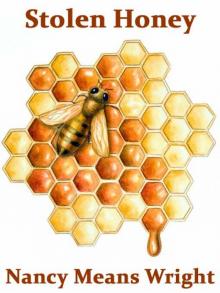 Stolen Honey
Stolen Honey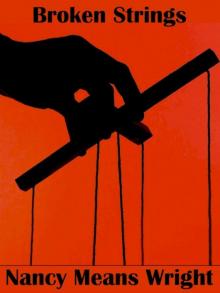 Broken Strings
Broken Strings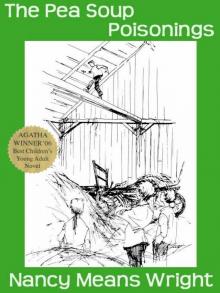 The Pea Soup Poisonings
The Pea Soup Poisonings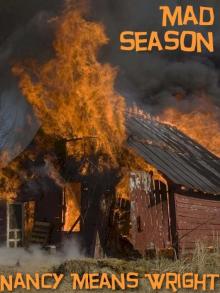 Mad Season
Mad Season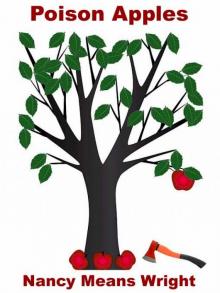 Poison Apples
Poison Apples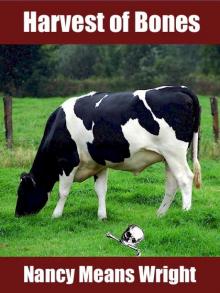 Harvest of Bones
Harvest of Bones